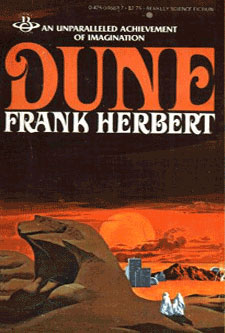
Dune, by Frank Herbert
Book Review by David L. Felts
So how is it that a life-long fan of science fiction could have reached the age of 51 without ever finishing Frank Herbert's Dune? I'd started it more than once, but never made it more than 50 or so pages in. How could one of the most celebrated science fiction books of all time fail to grab me? I finally decided that the time had come, and a few weeks later I'm pleased to say I can finally add Dune to my list of completed books.
Although anyone reading this is probably familiar with the story, Dune is set some 21,000 years in the future and concerns an interstellar society controlled by the noble houses of different families, all of whom pay homage to the Emperor, even while they are in constant rivalry with each other.
Paul Atreides, of House Atreides, is the son of Duke Leto Atreides. Duke Leto just accepted stewardship of the desert planet Arrakis. Arrakis is the only source of the strange substance melange, also called spice. Spice is considered the most important and valuable substance in the empire, as it is what gives the Guild the power to fold space and time for interstellar travel, as well as being used for a host of its other benefits.
Although far in the future and rife with advanced technology, artificial intelligence and advanced computers are prohibited. Certain sects of humans have trained their minds to effect of gaining extraordinary abilities. The Mentats are much like human computer, capable of complex calculations and analysis. The Bene Gesserit read thoughts and see glimpses of the future. In the Spacing Guild, humans altered by unfettered consumption of spice, have a monopoly on space travel. Spice is also used generally throughout the Empire to improve health, extend life, and promote mental acuity. He who controls the spice, ultimately, controls the empire.
House Atreides has long been in conflict with House Harkonnen, the former stewards of Arrakis. Baron Vladimir Harkonnen and the Emperor plan the destruction of House Atreides and control of the spice. Jealous of Duke Leto's popularity, the Emperor assists Baron Harkonnen, but does so in secret, since if it were known he personally participated in the attempted destruction of one of the noble houses, he could lose his position. To disguise his role, he enlists House Harkonnen and Baron Vladimir for the assault, sending along his elite troops, the Sardaukar, disguised in Harkonnen livery.
On Arrakis, much is revealed as the Harkonnens and Sardaukar attack and the Atreides are forced to flee into the desert to take refuge among the mysterious Fremen. From that position, they plan their retaliation. Paul, his powers awakened by the spice, seed a variety of futures and struggles to avoid what may potentially be an unavoidable war.
This brief synopsis falls far short of the complexity of politics and intrigue the novel details, as well as the large cast of characters who all play a role. That very complexity was one of the reasons why it took me so long to finally get through it. The novel is so complex, so involved, so detailed, that even as I turned the final page I was left feeling as though I'd skimmed the surface.
That Dune is a book that demands multiple reads to fully absorb. That it stands a mile stone in science fiction is beyond doubt. Don't wait as long as I did to read it.
|
Click here to buy Dune, by Frank Herbert on Amazon
|
Dune, by Frank Herbert on Amazon

| More Books You Might Like |
| Comments on Dune, by Frank Herbert |
| There are no comments on this book. |


